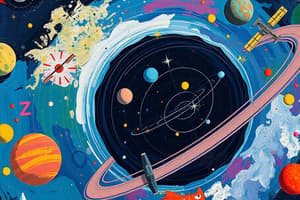Podcast
Questions and Answers
What attributes of celestial entities are studied in astronomy?
What attributes of celestial entities are studied in astronomy?
Attributes, genesis, and evolution
What is the significance of studying astronomy?
What is the significance of studying astronomy?
Fosters critical thinking, problem-solving skills, and a sense of wonder and curiosity
When did the first ever astronomical empirical observations take place?
When did the first ever astronomical empirical observations take place?
5000 years ago in Mesopotamian civilization
Who is credited with making the first telescope in the history of astronomy?
Who is credited with making the first telescope in the history of astronomy?
What are the four largest moons of Jupiter discovered by Galileo Galilei?
What are the four largest moons of Jupiter discovered by Galileo Galilei?
Who is regarded as the 'father of astronomy'?
Who is regarded as the 'father of astronomy'?
What is the title of the influential work written by Claudius Ptolemy?
What is the title of the influential work written by Claudius Ptolemy?
What is the significance of Claudius Ptolemy's work in astronomy?
What is the significance of Claudius Ptolemy's work in astronomy?
How does astronomy impact technological advancements?
How does astronomy impact technological advancements?
What is the historical significance of Galileo Galilei's discovery?
What is the historical significance of Galileo Galilei's discovery?
What is the unique perspective that astronomy offers on the universe?
What is the unique perspective that astronomy offers on the universe?
What is the scope of astronomy in terms of its investigation?
What is the scope of astronomy in terms of its investigation?
Flashcards are hidden until you start studying
Study Notes
What is Astronomy?
- Astronomy is the empirical and theoretical investigation of celestial phenomena.
- It encompasses the study of astral bodies, including stars, planets, and galaxies, as well as the macrocosm as a whole.
- Astronomy scrutinizes the attributes, genesis, and evolution of celestial entities, and the physical laws that orchestrate their motion and interplay.
Importance of Studying Astronomy
- Astronomy offers a unique perspective on the universe, allowing us to unravel its mysteries and expand our understanding of the cosmos.
- Studying astronomy fosters critical thinking, problem-solving skills, and a sense of wonder and curiosity about the world around us.
- It contributes to technological advancements and innovations in fields such as space exploration, telecommunications, and imaging technology.
History of Astronomy
- The first ever astronomical empirical observations date back 5000 years to the Mesopotamian civilization.
- Galileo Galilei, a pioneer in astronomy, made the first telescope and discovered the four largest moons of Jupiter, later named the 4 Galilean moons.
- Claudius Ptolemy, a Greco-Egyptian astronomer, is often regarded as the "father of astronomy" and authored the influential work "Almagest", which synthesized Greek and Babylonian astronomical knowledge and proposed the geocentric model of the universe.
- Nicolaus Copernicus, a Polish astronomer, is famous for presenting the widely accepted heliocentric model, where the Sun is at the center and all other planets orbit around it.
What is Astronomy?
- Astronomy is the empirical and theoretical investigation of celestial phenomena.
- It encompasses the study of astral bodies, including stars, planets, and galaxies, as well as the macrocosm as a whole.
- Astronomy scrutinizes the attributes, genesis, and evolution of celestial entities, and the physical laws that orchestrate their motion and interplay.
Importance of Studying Astronomy
- Astronomy offers a unique perspective on the universe, allowing us to unravel its mysteries and expand our understanding of the cosmos.
- Studying astronomy fosters critical thinking, problem-solving skills, and a sense of wonder and curiosity about the world around us.
- It contributes to technological advancements and innovations in fields such as space exploration, telecommunications, and imaging technology.
History of Astronomy
- The first ever astronomical empirical observations date back 5000 years to the Mesopotamian civilization.
- Galileo Galilei, a pioneer in astronomy, made the first telescope and discovered the four largest moons of Jupiter, later named the 4 Galilean moons.
- Claudius Ptolemy, a Greco-Egyptian astronomer, is often regarded as the "father of astronomy" and authored the influential work "Almagest", which synthesized Greek and Babylonian astronomical knowledge and proposed the geocentric model of the universe.
- Nicolaus Copernicus, a Polish astronomer, is famous for presenting the widely accepted heliocentric model, where the Sun is at the center and all other planets orbit around it.
Studying That Suits You
Use AI to generate personalized quizzes and flashcards to suit your learning preferences.





